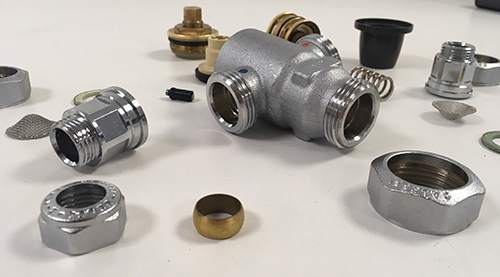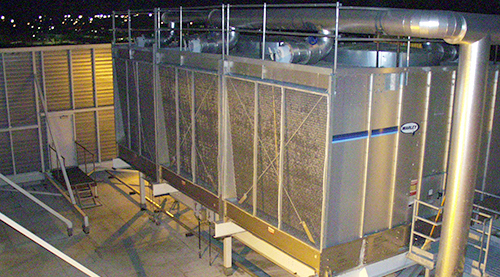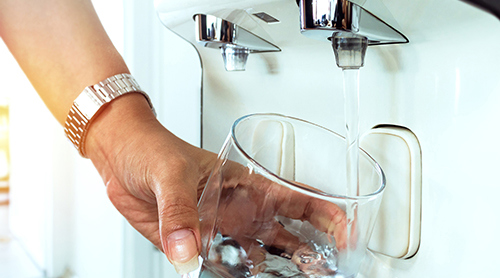Following a risk assessment, certain assets may require regular servicing to ensure they remain safe and compliant.
We offer the following services:
Showerhead clean and disinfection
Routine water sampling is the most cost effective way to determine if the actual quality of the water in any premises is fit for purpose. We offer a full sampling and inspection service to cover any water system. Water samples are collected in appropriate bottles by our technicians and sent off to a UKAS accredited laboratory for analysis. The results are then reported back to our customers with recommendations for any required action.
Samples can be taken from cold water storage tanks, showers, calorifiers, water heaters, cooling towers, jacuzzis – in fact any hot and cold water system.
TMV servicing
Increasing hot water temperatures at outlets to over 50 degrees centigrade is necessary to control legionella bacteria, yet this can increase the risk of scalding.
TMVs are a device which will effectively avoid scalding to ensure that the water temperature is safe and comfortable. Hot and cold water is blended as it passes through a valve on its way to the tap, ensuring it’s at the optimum safe temperature when it reaches the water outlet.
Where a risk assessment recommends the fitting of TMVs, the strainers or filters should be inspected, cleaned, descaled and disinfected taking into account the manufacturers. TMV failsafe checks are also carried out six-monthly to ensure they are working correctly in the event of a water supply failure, where they may automatically shut off.
TMV servicing is of paramount importance particularly in schools and care homes and hospitals where the vulnerable and elderly are susceptible to scalding.
Cooling towers / steam boilers
Water within cooling towers or evaporative condensers is heated via heat exchanger, which is an ideal environment for Legionella bacteria to grow. So, this is a high-risk area for businesses and from specialist cleaning to water treatment and analysis we can guide you on how to ensure all health and safety requirements are satisfied.
Our specialist technicians are all qualified to work safely in confined spaces, the use of chemicals and legionella control.
See the HSE Executive guidance on the control of legionella bacteria in evaporative cooling systems.
Water softeners
We can supply and fit you a commercial water softener. Limescale can be left behind by hard water. It can cause scaling in your kettle, dishwasher and washing machine - as well as in your pipes and boilers - reducing their lifespan.
Softened water also benefits your skin and you will use 50% less soap and shampoo to produce a much better lather. Research has also shown that many skin conditions, including eczema benefit from less harsh water.
If you already have a water softener, we can service and repair it for you.
Steam boiler chemicals
Proper water treatment is essential for preventing corrosion, scaling, and other issues in boilers.
Oxygen Scavengers Dissolved oxygen, especially in conjunction with low pH (low alkalinity), is a major cause of corrosion in boilers. High alkalinity can also contribute to the problem. Chemical oxygen scavengers are used to eliminate oxygen from the feedwater, protecting the boiler from corrosive damage.
Dispersants Scale formation occurs due to the precipitation of insoluble calcium and magnesium salts, creating a rock-like coating inside boiler tubes. Conditioners, such as phosphates and polymers, react with residual hardness in the incoming feedwater to prevent scale deposition. Phosphates mop up residual hardness that could form scale, while polymers disperse or condition the resulting sludge, making it more mobile for removal through blowdown procedures.
Inhibitors Corrosion can also occur in condensate return lines, caused by oxygen in the steam or carbon dioxide. While oxygen should ideally be removed during feedwater treatment, any remaining oxygen can be addressed with an oxygen scavenger. Corrosion can be controlled by pre-treatment techniques or by adding inhibitors that form a protective film on the surface of the condensate lines, safeguarding them from corrosive elements.
Cooling tower chemicals
Proper chemical treatment in cooling towers is essential for preventing bacterial growth, scaling, and corrosion. Here are the key chemicals used:
Biocides The water within a cooling system provides optimal growth conditions for many species of bacteria, including Legionella spp. Ideal temperatures and high levels of organic debris create a suitable environment for rapid bacterial growth if left uncontrolled. Legislation requires that cooling towers prevent the proliferation of Legionella bacteria to avoid outbreaks of Legionnaires' disease. Implementing the correct biocidal treatment regime and conducting regular checks are critical to keeping bacterial populations under control.
Scale Inhibitors Scale formation occurs due to the precipitation of calcium and magnesium salts. Scale inhibitors are chemicals that make these salts soluble, preventing their deposition. Additionally, acids such as sulfuric acid can be added to lower the pH and alkalinity, further reducing the potential for scale formation. This method is sometimes employed for scale control in larger cooling systems.
Corrosion Inhibitors Corrosion results from the chemical interaction between materials and their environment, leading to the loss of metal from surfaces, often accompanied by pitting and deposit formation. Corrosion is accelerated by high levels of dissolved oxygen, particularly in conjunction with low pH (low alkalinity), though excessive alkalinity can also be a factor. Temperature and the concentration of dissolved solids are additional factors. Chemical corrosion inhibitors are available that generally act by forming a protective film on metal surfaces, thereby preventing corrosion.
Alternatively if you wish to chat to one of our trained representatives please call us on - 0845 603 2152 or email info@aquacarewms.co.uk




